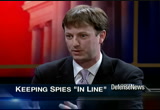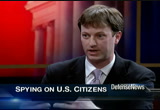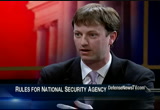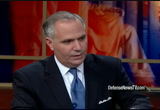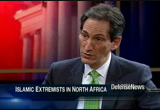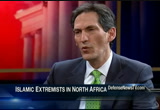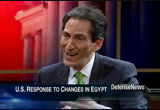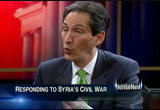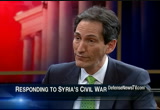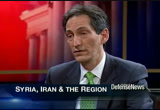tv This Week in Defense CBS February 10, 2013 8:00am-8:30am EST
8:00 am
welcome to "this week in defense news." i'm vago muradian. from mali to egypt to syria, unrest across north africa and the middle east is growing. one leading expert tells how washington should respond to promote stability and protect its interests. but first, the tense line between personal privacy and national security has been an issue since 9/11. few agencies are more secretive or more involved in sensitive global intelligence collection and analysis than the national security agency. which must deal with this delicate issue on a daily basis. nsa technical experts must keep
8:01 am
the nation safe complying with all rules and regulations. the man heading up the effort to quote keep the spies in line as some say is john delong. nsa's first ever compliance director. john welcome to the program. >> thanks for having me on the show. >> so let's starlet out. i mean -- start out. i mean the stereotype is that the national security agency can spy on anybody it wants to spy on and can do anything that it wants but you guys are really in a delicate spot as an intelligence agency who has to cope with this issue daily. why was your job created and how do you make sure that nsa stays in line with all personal privacy regulations as they exist? >> great. first i think it's important to define what compliance is. lots of different ways. i like to think about it as bringing rules the life. and so -- to life. and so nsa as a federal agency is very heavily regulated. right? subject to specific authorizations. and so compliance is about bringing those rules to life. those rules are designed externally right and so what we
8:02 am
really try to do is take the rules, our operations, our technology and make sure these are all aligned constantly right? every single day through every activity. so that's really the role of a compliance organization. why was the job created? i think your second question -- >> you're the only person -- the only compliance director the agency has had. >> not the only compliance director the agency has had. a new title testimony agency has had a -- title. the agency has had a head of compliance. what we did was very much what entry did. which was to say we need a chief compliance officer. we need somebody working for the director. we need somebody working across all of nsa. we need to really add a lot more technical controls. need to make sure we understand technology is ever changing, ever faster. we need to make sure we have someone who's understanding are we resourced creditably and do we have the -- correctly and do we have the right strategy. you started with you know the stereotype that i think it's very important for people to understand that you know my
8:03 am
role as compliance, the compliance program is against a backdrop of external oversight. regulation across all three branches of government. and that's a constant. that's something that occurs every day. that's not an after or before the fact thing. it occur all the time. >> what happens to those who don't play by the rules and you know, and what's your role in them? i mean are these people reprimanded, punished, fired? how does the process work? >> sure. so every employee who comes in, every person who works with the nsa is reminded of their obligation to report. if they believe something is about to occur or has occurred. it's their duty to raise their hand and report up. we will also report all these to the overseers. the big misconception if you will sorry, is that you know is if somehow there's people desiring to not follow the rules. the reality is that we select people before we bring them into the agency we want to understand they understand
8:04 am
accountability and respect for the law. they have our core values. they take on oath of the constitution. and they come in and they're reminded annually. periodically. and if they get access to you know, if they're actually working in the operations obviously we have people who build buildings and other kinds of things, but if they're actually working with the information. they're subject to annual training and testing and their activities are reviewed. this isn't something where right you know we're a free agent and we wake up and we decide what to do. we're very heavily regulated and technical internal controls and sometimes even the systems if something is prohibited the systems won't be allowed to do it. it's not just a person thing, it's also a systems thing. >> it's a systems thing, but at the same time after 9/11, there's been this drive to better collect intelligence docs. nsa has been one of the organizations that has sister agreements globally in order to you know -- in that you're collecting vast amounts of information that include information on american citizens. i know there are some former officials who have accused the
8:05 am
agency on spying on americans. general alexander said that's not the case. but how do you get around the challenge, what organizations around the world are doing under agreement with us for us, in order to preserve the national interests -- security interests of the united states and protect an attack from happening? >> a couple of points that are important. one is that nsa operates under specific authorizations and regulations that are externally approved. the governance comes from across all three branches of government of course rooted in the constitution. secondly we are set up and governed specifically, but our activities you know my office obviously comes in saying let's keep the rules aligned with the technology. aligned with the operations right making sure that's all working together. then there's constant overtight. so make sure that not only while we're doing it but after we've done it to make sure people understand and then do that feedback loop right to make sure we're constantly learning and adjusting. >> how do you -- let's take from the standpoint of just the
8:06 am
sheer amount of e-mails, texts. all -- you know facebook, twitter. all of those are ricocheting all over the world. how -- how do you -- you know sort of thread that needle if you will. this might be something that's interesting and on the other hand this might violate somebody's privacy. what's the process you go through to make sure that something that may be actionable or interesting that comes in in the massive information you're sticking by the law and the rules but you also end up managing not to miss or bury something that you might -- might need? >> sure great question. i'd start with the rule themselves which is you know, they're called various things. you can call them regulations and specific procedures. the word is important. minimizing. all right so every step of the process. the rules themselves have taken into account right, just the exact thing you need. which is we always need to follow them. right but we also have a need to provide actual intelligence to our military. our decision makers, our policymakers. so the rules contemplate those exact kind of things that you
8:07 am
-- that you envisioned which is right we're going to be billing in information. we're going to have to sift through it right and appropriately protect any u.s. person information we come across and focus on the foreign intelligence. and again remember, nsa is part of the intelligence community right but their mission in the intelligence world is foreign intelligence. that operative word is foreign. >> right but that information also does get tans translated -- translated to folks locally who can deal with it. the fbi and other organizations for example. what -- mechanisms do you have from compliance -- are there any mechanism that is also like reach out to the other agencies for example in how you sort of coordinate your role compared with i mean -- you know we have 18 or so intelligence agencies. which obviously the director of national intelligence was created to sort of streamline. what's the connection you have maybe with the other intelligence organizations that exist across governments? >> sure. again kind of going back@rules i always -- to the rules, as a compliance person you start with the rules right? because we're kind of like the rules coaches.
8:08 am
we're there to help people understand the rules. the rules take that into account. how is information going to be shared right and let's make sure we appropriately do that and provide safeguards and that. and also, you know, my office in particular and other offices across nsa are reaching out to the counterparts right to make sure we understand to the extent data is education changed or you know -- exchanged or you know we might issue a report to make sure more with nsa compliance director john delong in just a moment. you're watching "this week in defense news."
8:09 am
it's been a long, tough year. a real test of what i'm made of. there were times i thought of giving in, but i did it. opened up that navy federal savings account and now we have this... ah. did it all online... it was easy. i don't hear any sweating. civilians... psh. 4 million members. 4 million stories. navy federal credit union. we're back with john delong, compliance director of
8:10 am
the national security agency. sir, let me take you to -- and i know that just about everything that would be an example would be i think a little bit difficult for you to share with us probably on how it works. but can you talk a little bit about the evolution of the compliance practices and how they've changed over the last couple of years? >> absolutely. we've -- we've always had some foundational parts. trainings for example of humans. of -- of new employees that come in. training commensurate with the position. the degree to with they're working with data. competencesy testing. it's not technology and the systems and to some degree it's the same idea. how do we train our systems and give them competency tests right no you know you might have this vision of a computer in a classroom filling out a test. but it's something functionally equivalent. that's required us to take the laws, the policies, the regulations right that exist on paper and literally figure out a way to manage them in such a way that we can then directly connect them with the systems
8:11 am
such that this requirements packages for example -- that go into our systems, directly incorporate those. so we're not just relying on training the people who build the systems. we'll always do that and having them build them but more directly so. so as you can imagine that's an evolution you tends to think of rules as on paper. >> right, you mentioned technology. i mean one of the thing aztecnology is constantly -- things that technology is constantly changing. and also within the intelligence communities, there are now greater file sharing than there are ever were. fewer compartments than there ever were. how do you -- how do you do your job as this technology continually changes? >> that is one of the big challenges in technology is from changing faster and faster. and for us, it actually starts earlier than just kind of you know you think about the operational and technology compliance, which is because our authorizations, our procedures, our -- you know come from external entities, the first step in that is to actually describe our technology, describe the technology right, in the
8:12 am
communications environment. and so we not only have to you know figure out how to comply with these and describe that up such that the rule themselves can take into account right, that interaction. those rules that need to protect privacy. >> right. >> bring in the constitution. the statutes, the executive orders, et cetera. >> how do you work -- you obviously work closely with the nsa inspector general. what do each of you do and how do you complement one another in the entire process? >> that's a question i get all the time even on the resourcing issue. why do we have both of you? i think -- we talk all the time. so -- >> which is good. >> which is good. the -- the important thing is i think and inspector general has a degree of independence. right? we -- and that's important. right to have a structural independence, obviously they're within nsa but structurally independent so they can come in and very, very objectively right, evaluate and review and audit a compliance officer and a compliance organization is there really as more of a rules coach if you will. right no not deciding what the rules are. that's the lawyers and policy
8:13 am
folks and not building technology. not doing operations. but getting in there, rolling our sleeves up right. really kind of on the field if you will. as a referee, not as a -- you know, up in the stands but somebody there is a rules coach who's constantly doing that. so for example my office, our activities are reviewed by the inspector general. >> right. >> right and we want that. we want that. >> and oversight panels as well. >> and panels across all three branches of government. >> what is -- what is the one thing that keeps -- the things that keep you up at night? i imagine there could be a lot of things that keep you awake. >> there are, our kids for one. [ laughter ] no, but it's -- they're great rewarding days. there are you know challenging days, there are dynamic compliances that place where you're kind of a microcosm of the organization for us. it's a lot of technology, a lot of operations you know, so when i walk out, you know blazing you know -- we were kind of blazing the trail and especially in the technology compliance and that keeps me up. you know always thinking about what am i going to do next.
8:14 am
what's the next best practice we can draw from industry that we can you know maybe reach back do industry. there's some great things out there. but i'll be honest with you. at the end of the day like all nsa employees we go back to our lives, we're citizens just like everybody else. and so to some degree i sleep well at night. if -- that makes sense. >> that's fantastic sir. thank you very much for joining us. we really appreciate it. >> great thanks for having me. up next how wash
8:17 am
two years after the arab spring swept north africa and the middle east, unrest continues across the region. last week one of the men who helped bring rule to an end in tunisia was assassinated and france continues operations against al-qaeda and extremists in nearby mali. in egypt, there's growing opposition to president mohammed morsi and his muslim brotherhood. in syria the civil war continues and it's gotten more complex in the wake of israeli air strikes to keep damascus from shifting weapons to nearby lebanon. here to help explain recrenate vents is jon alterman the director of the mideast program at the center for strategic and international studies. sir, thank you for joining us. >> good to be with you. >> so let's start. in north africa we have recent events in tunisia and we have the french operations in mali which least initially appear successful and scattering the al-qaeda elements and separating them from the tuareg
8:18 am
and insurgents. how's the united states need to deal with this in a broad way? does it need to be getting involved in both mali and more broadly in the region? what do we need to be doing? >> if you're talking about intervention mali it's a question of what you're trying to do. what are you trying to reach? there are a whole series of problems in mali some of which are likely soluble and some are likely insoluble. we were training the military and then the military got rid of the democratic government. that makes it hard for us to even help the current government in mali because there are -- put in force by military coup. we have to pick our battles and work with allies i think. i think we can do a lot sharing intelligence. we can do a lot of specific things i think the heavy lifting is probably best left to people like the french. who have their own reasons, their own ties and their own capacities in the countries. >> and also have created the coalition for the -- muslim guys from chad going to the north. and then obviously the afghan
8:19 am
troops in the south. do -- what about events in tunisia? i mean what does this tell us more broadly about the region and the environment we're headed? >> we think about islamist parties coming to the forefront. >> morsi in egypt. >> you've seen the line of pressure between the islamist parties and liberals. but we vent spent much time thinking about is what's the line on the other side between the islamist parties and a whole series of radicals and crazies and violent extremists as call themselves as being the islamist umbrella. i think where we're seeing right now in tunisia is there will be a necessity not only to define the leftward border of who's an islamist but what's the right of the border? how that plays out? i think in tunisia we'll have a demonstration effect. it's going to have to happen in egypt and country after
8:20 am
country. >> there's really not much the united states can do. once you sort of unchain democracy it goes into directions you may not necessarily like. what does the united states need to do for example in egypt where washington plays a role in getting rid of mubarak? >> i think washington played a ole in getting the -- role in getting the military to act in a responsible way. there were lots of phone calls that went out and said you know don't turn the guns on the people. to that extent it worked out well. i think the u.s -- the largest power the u.s. has and not micromanaging egyptian politics but on a strategic level egyptian government needs money. and the u.s. has i think an unparalleled position in helping coordinate the world. a number of gulf states and saudis, are very, very skeptical of the government of mohammed morsi. of the brotherhood. i think the u.s. can play a role working to get the inf on board and the gulf states on board. we are more of a leader of a coordinator, than i think a
8:21 am
micromanager. they're not looking for a micromanager but they are looking an insurance policy and the u.s. can help provide that provided that there's a set of behaviors which aren't bad for american interests. >> let's go to syria. now, we're in the second year of the civil war there. it's gotten more bloody and it's gotten more brutal. every once in a while you hear that damascus is considering bad weapons to use against their population. and there's increasing disdains among many in the international community that at some point there needs to be an intervention. are we going to see a form of intervention in 2013 and is that a good idea and if so what's the best way to do it? >> i think we've seen a form of intervention already and it's unclear exactly what that is. but i think it's important we see what's happening in syria is act one. i think -- he's going to leave. that's act one. the second is the battle for the -- the struggle for control after us. that's act two. that's going to go on for a long time and then whatever
8:22 am
that settles into is going to be act three. when you think about the u.s. position, the u.s. is not only interested in act one. the u.s. interest is actually in act three. and what do we have to do in act one and act two and what do we have to do in act three? how do we sustain an effort and how do we align with the people we need to and get the influence we need and how do we not do everything at the beginning and then be left without policy options? we have to look in the long- term what is syria going to be and what's it going to represent? i think as we deal with the whole issue that people are coming from all over the middle east and they're training and networking, what does that mean for the rest of the middle east. there are lots of roles for the united states that have absolutely nothing to do with the kinds of weapons we should or shouldn't give to insurgents many of whom don't know about them before or after. >> what do you think of the theory -- you know obviously iran is supporting assad and syria. they have been supporting hamas and gaza and they have been
8:23 am
supporting hezbollah and lebanon. true or false? >> because what iran does -- iran has a whole series of proxies and their whole game is an asymmetrical game. and i think what you may well be looking at is iran reminding everybody of their ability to do damage in a string that goes from rememberon through syria through -- lebanon through syria through iraq. down through kuwait into yemen and maybe beyond into the horn of africa. the idea that iran is going to behave because we've taken away their chief ally i think is ill losesy. what's going to happen is iran is going to look for ways to frustrate american aims because the entire goal of their strategy isn't to get anything positive. it is to frustrate the goals of americans strategy. >> how does israel's strike change the dynamic and are regoing the see israel become more involved or some conflict break out with hezbollah? >> several things have to
8:24 am
happen. one of the things is the new formation of the government in israel. i think the obama visit may play a role. it feels to me like really the politics are very, very much influx more so than they've been if you have for example president obama being very successful in his domestic program. feeling like he's more of a leader, more sure in his negotiations with people. i think that puts benjamin netanyahu in a different place than he's before been. >> we appreciate it. thank you for joining us. coming up my notebook. ♪
8:26 am
france's operation in mali hasn't even ended, but already it's offering lessons for the future as u.s. and european militaries pare back spending. first, credit france and its allies for acting swiftly and decisively to keep mali from falling to al- qaeda, islamists and tuareg rebels. indeed the french operation drove islamists and tuaregs to turn on al-qaeda. second, light highly trained well armed special operators light infantry and paratroopers backed by air power proved vital. third, france crafted its thoughtful coalition to trade mali forces with troops from chad securing the north and african units doing the same in the south. allowing french soldiers to start leaving in march. crack french special operators however will remain in the country to hunt for insurgents. fourth, airborne intelligence
8:27 am
surveillance and reconnoisance are critical. radar planes that can track individuals in vehicles across vast areas are in hot demand. only america and britain have such planes and london provided one jet for mali operations. u.s. planes are needed in afghanistan but washington must support the mali mission as well. as the nations eye life after afghanistan it's important to remember the world won't cooperate. security depends on having the will, the capabilities, the allies, and the thoughtful plans to intervene effectively and quickly when necessary. thank you for joining us for "this week in defense news." i'm vago muradian. you can watch this program online at defensenewstv.com. or you can e-mail me at vago@defensenewstv.com. we'll be back next week at the same time. until then, have a great week. [ captions by: caption [ captions by: caption colo it's been a long, tough year. a real test of what i'm made of. there were times i thought of giving in, but i did it. opened up that navy federal savings account and now we have this... ah.
8:28 am
8:29 am
will science be sequestered? we hear from a top republican who oversees the hhs budget. and a key democrat on the tax writing ways and means committee. i'm steve usdin, welcome to "biocentury this week." >> your trusted source for biotechnology information and analysis. "biocentury this week." when president obama delivers the state of the union address this week, he'll be speaking to a polarized congress that's stumbling from deadline to deadline. if congress doesn't act by march 1, budget sequestration will slash funding for biomedical research and oversight of the nation's food and medical products. today, we'll talk about sequestration with one of the most conservative republicans in congress, and one of the most liberal democrats.
82 Views
IN COLLECTIONS
WUSA (CBS) Television Archive
Television Archive  Television Archive News Search Service
Television Archive News Search Service 
Uploaded by TV Archive on

 Live Music Archive
Live Music Archive Librivox Free Audio
Librivox Free Audio Metropolitan Museum
Metropolitan Museum Cleveland Museum of Art
Cleveland Museum of Art Internet Arcade
Internet Arcade Console Living Room
Console Living Room Books to Borrow
Books to Borrow Open Library
Open Library TV News
TV News Understanding 9/11
Understanding 9/11



